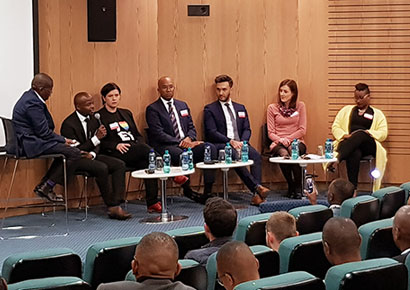Africa’s first LGBT+ Workplace Equality Index launched
 Senior corporate leaders have spoken about the impact of being out in the workplace at the launch of the inaugural LGBT+ SA Workplace Equality Index (SAWEI) in Sandton on Thursday night
Senior corporate leaders have spoken about the impact of being out in the workplace at the launch of the inaugural LGBT+ SA Workplace Equality Index (SAWEI) in Sandton on Thursday night
The South African LGBT+ Management Forum formally launched the index, allowing companies to apply to take part in Africa’s very first survey that will asses their levels of LGBT+ equality and diversity.
The event coincided with the International Day Against Homophobia, Transphobia and Biphobia (IDAHOTB), and was attended by executives from a number of corporates and multinationals.
The Forum’s chairperson, Dylan van Vuuren, described the launch of the index as a “historic moment for Africa, South Africa and the Middle East.”
He explained that the Forum is an umbrella organisation of LGBT+ network employee groups that works “to create a safe and equitable workplace, to make sure that LGBT+ employees have the best chance of fulfilling their full potential”. It aims, he said, to be “the voice of the corporate sector on LGBT+ issues.”
The group’s flagship project is the index, which will benchmark LGBT+ inclusion in the South African workplace. A generation ago, van Vuuren said, such an index would not have been possible. “Similar benchmarks have been highly successful in the US, UK, Canada, Australia and Hong Kong and are a powerful tool to help companies benchmark themselves against peers and to identify areas of improvement.”
The Forum’s head of communication, Farai Morobane, added that a change in attitudes and acceptance of LGBT+ people in the workplace not only affirms the values of the South African Constitution, but also affects “business performance, productivity and attracting the most diverse talent pool” and has “the potential to create positive social change in society.”
All companies are invited to participate in the index– free of charge – by completing a set of questions online about LGBT+ equality and inclusion in their company. They may opt to do so anonymously, or have their contribution to a fairer, more inclusive workplace publicly available.
The results will be reviewed by two independent moderators and are overseen by an advisory panel of five high profile individuals. Companies will be tiered under Gold Standard, Silver Standard or Inclusive Standard. The final index will showcase and celebrate the most LGBT+ inclusive employers in South Africa, and will help LGBT+ talent select which companies they aspire to work for. Companies can also use the results of the report to asses where there may be areas for improvement.
Fifteen companies have so far confirmed that they are participating in SAWEI. Other companies have the next six weeks to request to take part in the Index by visiting the Forum website.
The function also hosted a screening of the film Inxeba followed by a discussion on the impact of South Africa culture on LGBT+ workplace equality. The panel included executives such as Sharon Mcgregor, Procter & Gamble Senior HR Manager; Nthato Minyuku, Shell Head of Government Relations; Claire Lawrie, Partner at EY; Temi Ofong, ABSA Co-Chief Executive of Corporate and Investment Banking; Siya Mnyanda, SAP Cloud Procurement Specialist; and Ahmed Mokdad, from Norton Rose Fulbright.
Most of the panelists are themselves out and spoke about the importance of employees feeling safe to be their authentic selves in the workplace; a space in which most people spend the majority of their waking time. They also addressed the challenges of having offices in countries in which LGBT+ people face legal and social persecution.
Shell’s Nthato Minyuku admitted that there is still work to be done, especially in traditionally hetronormative and patriarchal spaces such as a refinery floor, as compared to a corporate head office. Absa’s Temi Ofong, who is openly gay, also said that the impact of LGBT+ company leadership being out to their staff could not be underestimated.
“Is it important for senior members of staff who are gay or lesbian to be out? I think it is. I think it’s a huge responsibility and you don’t always know how many lives you touch, but I promise that you do,” he said. “You can have big banners and all the policies in the world but it is down to that personal interaction with individuals and I personally take it very seriously. Not just being a gay man, but being a black gay man. We have a duty to be who we are, to be excellent at what we do, be great role models and to tell other people that it’s actually okay.”
For more information visit the South African LGBT+ Management Forum website.
- Facebook Messenger
- Total133
Leave a Reply